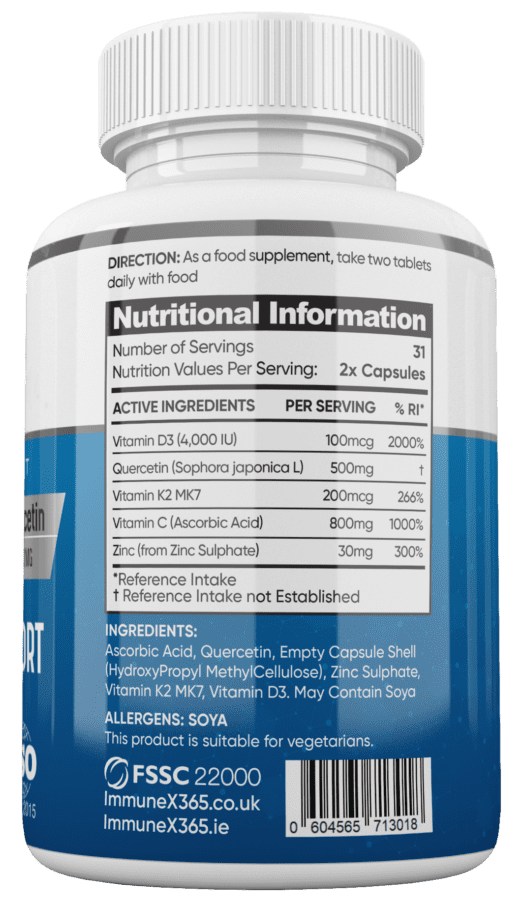Travelling can be an exciting and enjoyable experience, but it also comes with a set of challenges that can put a strain on your immune system. Being in close proximity to other people, exposure to new environments and allergens, and the stress of travel can all weaken your immune system and increase your risk of getting sick. This is why it is essential to boost your immune system before flying away on your holidays.
There are several ways to boost your immune system naturally. One of the most important steps is to maintain a healthy diet that is rich in vitamins and nutrients. Eating a diet that is high in fruits, vegetables, whole grains, and lean proteins can help provide your body with the essential vitamins and minerals it needs to fight off infections and viruses.
Immune boosting supplements
In addition to these lifestyle factors, there are also several supplements that can help boost your immune system. Vitamin C is one of the most well-known supplements for immune health, as it is a powerful antioxidant that helps boost white blood cell production. Zinc is another important mineral that can help support immune function, as it plays a role in the production and function of immune cells. Vitamin D builds immunity and helps fight off infection by regulating the activity of immune cells which elicit antiviral responses.
Are you risking your health by flying?
Apart from the obvious risk of flying (which we won’t talk about ), planes are known to be a hotspot for germs and diseases, and there are several reasons why flying increases your chances of catching an illness.
Airplanes are enclosed spaces with a large number of people in close proximity to each other. The air inside the cabin is recycled, meaning that any germs or viruses that are present can circulate and infect multiple passengers. The close proximity of passengers means that there is a higher likelihood of direct contact with someone who is sick, transmitted through coughing or sneezing.
Low humidity Levels
Another factor that contributes to the spread of disease on planes is the low humidity levels. The air inside airplanes is typically very dry, which can cause irritation to the nasal passages and throat, making it easier for germs and viruses to take hold. Additionally, dry air can cause the mucous membranes in the respiratory tract to dry out, making them more susceptible to infection.
Dehydration
The stress and fatigue associated with air travel can also weaken the immune system, making passengers more vulnerable to infections. Long flights can disrupt sleep patterns and cause dehydration, which can further compromise the immune system and increase the risk of infection. Remember”Drink to boost your Immune System”.

Things to be wary of at Airports
Airports themselves can also contribute to the spread of disease. Many travellers pass through busy airports and come into contact with a large number of people from all over the world, increasing the risk of exposure to different types of viruses and bacteria. The surfaces in airports, such as door handles, security trays, and check-in counters, can also harbor germs and viruses that can be easily transmitted to travellers.
While it is important to take steps to boost your immune system before travelling, there are also several precautions you can take while on your trip to help reduce your risk of getting sick. Washing your hands regularly, avoiding close contact with sick individuals, and avoiding touching your face can all help reduce your risk of getting sick.
Stay hydrated
In addition, it is important to stay hydrated while traveling, as dehydration can weaken your immune system and increase your risk of getting sick. Drinking plenty of water and avoiding alcohol and sugary drinks can help keep you hydrated and healthy.
Increased risks to your Immunity System when visiting foreign countries
One of the primary reasons for boosting your immune system when traveling abroad is to protect yourself against potential infections and diseases. Different countries have different health risks, depending on factors such as geography, climate, and local health practices. For example, some countries may have a higher incidence of mosquito-borne illnesses like malaria or dengue fever, while others may have higher rates of foodborne illnesses like salmonella or E. coli.
Reduce the risk of getting sick
Boost your immune system before you travel and help reduce your risk of getting sick from these types of infections. By eating a healthy diet, getting regular exercise, and taking immune-boosting supplements like Vitamin D, Vitamin C, and Zinc, you can help strengthen your body’s natural defenses and reduce your susceptibility to infection.
Another important reason to boost your immune system when visiting foreign countries is to reduce your risk of contracting infectious diseases that may not be prevalent in your home country. Many countries require travelers to be vaccinated against certain diseases, such as yellow fever or hepatitis A, before entering the country.
However, even with vaccinations, there is still a risk of contracting infectious diseases while traveling abroad. By boosting your immune system, you can help reduce your risk of getting sick from these diseases, as your body will be better equipped to fight off any potential infections.
Boost your immune system and help deal with the stress and physical demands of travel. Traveling can be physically and mentally exhausting, which can weaken your immune system and increase your susceptibility to infection.
Although there is always a chance that you might catch something on your holidays taking immune support supplements before you travel will give you a better chance than most of enjoying your holiday to the full.
Our Unique Immunity Boosting Supplement-ImmuneX365

Targeted Immunity Support
ImmuneX365 is a powerful combination of nutrients proven to strengthen your immune system.
- Vitamin C contributes to immune defense by supporting various cellular functions of both the innate and adaptive immune systems. Because our bodies can not produce Vitamin C by itself, it must come from foods you eat daily or supplements.
- Vitamin D impacts the immune system and helps support systemic health. It signals the intestines to absorb calcium into the bloodstream and is essential in maintaining bone strength
- Vitamin K2 works synergistically with Vitamin D to help direct the calcium around the body to where it needs to be.
- Zinc is found in cells throughout the body. It enables the immune system to fight off invading bacteria and viruses.
- Quercetin is a plant extract that can help your body reduce inflammation and to improve your immune system’s health. Quercetin facilitates the transfer of zinc into cells through channels known as ionophores.
What actually boosts immune system?
There are many things that can help boost your immune system, including regular exercise, a healthy diet rich in fruits and vegetables, adequate sleep, stress management, and avoiding smoking and excessive alcohol consumption. Some supplements like Vitamin C, Vitamin D, and Zinc may also help support the immune system, but it’s important to talk to your doctor before starting any new supplements.
What are signs of a weak immune system?
Signs of a weak immune system can include frequent infections, slow healing of wounds, fatigue, and recurrent colds or flu. People with weak immune systems may also be more susceptible to certain types of cancer and autoimmune diseases.
How can I boost my immune system in 24 hours?
It’s not really possible to boost your immune system significantly in just 24 hours, but there are some things you can do to support your immune system in the short term. Drinking plenty of fluids, getting adequate sleep, and eating a healthy diet can all help. Taking Vitamin C or Zinc supplements may also be helpful.
What vitamins support immune system?
Several vitamins and minerals are important for immune function, including Vitamin C, Vitamin D, Zinc, and Iron. Eating a healthy, balanced diet that includes plenty of fruits and vegetables can help ensure that you’re getting all the nutrients your body needs.to boost your immune system.





